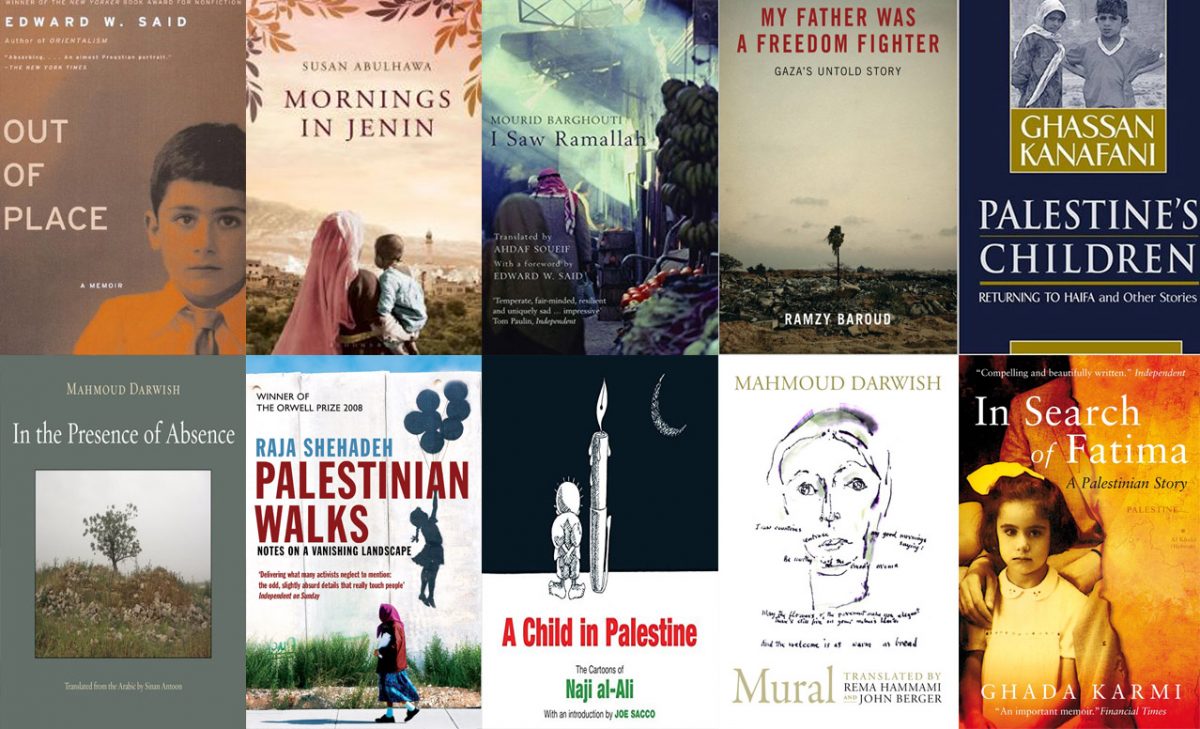Be honest, how many history books and encyclopedic explainers are sitting on your bookshelf or, even more imposingly, your bedside table, unread? We all buy them with the best of intentions, but try as we might, we all have incredibly busy lives, and rarely do these sorts of books actually get read, as their authorial voice drones on in our mind like our first-year professor, lulling us to sleep in the back of the lecture hall.
Here are 10 books to fix that, all beautifully and vitally written, mixing memoir and fiction (and even a bit of poetry). Palestine has produced some of the region’s best writers, and here is a wonderful place to start. These are in no order, so feel free to preorder one in print, or grab one instantly on your e-reader.
Keep an eye on esquireme.com for more guides on what to read from across the region.
Read our full list below:

1. In Search of Fatima by Ghada Karmi

This acclaimed memoir by Ghada Karmi tells the story of her early years in Palestine before having to flee to London, with intimate and candid reflections on her feelings of displacement and despair, and all of the inner turmoil that her situation has caused her. Karmi also wrote a follow up book, Return, about her journey back to Palestine with keen observations on the loss as she compares what her young eyes once saw with her adult ones.
2. My Father was a Freedom Fighter By Ramzy Baroud

There are many memoirs in which sons reflect on the lives of their fathers. There is none quite like this. Baroud’s account of his father’s story, a man who was driven out of his village in Palestine into a refugee camp, who then became a freedom fighter against occupation while balancing that with his life as a husband and a father, is not a hagiography but an interrogation, a dive into the complexity and harsh truths that his story provides, with empathy and insight that few are gifted with.
3. A Child in Palestine by Naji al-Ali

One of the Arab world’s greatest cartoonists Naji al-Ali’s work is collected here in A Child in Palestine, tracing his career after being discovered by the Palestinian poet Ghassan Kanafani in the second half of the 1950s through the subsequent through decades, with cartoons published across the region and the world that were at times controversial but always essential, calling attention to both the humanity of the artist himself and the Palestinian people, with a strong moral sense and unflinching eye.
4. Murals by Mahmoud Darwish

This acclaimed translation of the moving late poems of Mahmoud Darwish is a wonderful introduction to his work, just as affecting and insightful as the day they were written. Darwish is an essential voice in Palestinian literature, a poet whose stature in the region is impossible to overstate, a man who traced the tragedy and displacement of the Palestinian people to reach a level of success that few poets in history have ever seen.
5. In the Presence of Absence by Mahmoud Darwish

No list on Palestinian literature is complete without the acclaimed poet Mahmoud Darwish, and this list has two. To show the breadth of his work, we’ve included one book of poetry and one book of prose.
In the Presence of Absence is a fascinating piece of prose, with an aging Darwish reflecting on his youth and tracing the journey that his life will take him, infused with the poetic voice for which Darwish is renowned.
6. Palestine’s Children: Returning to Haifa and Other Stories by Ghassan Kanafani

Ghassan Kanafani was assassinated in 1972 in a car bomb, but before his death he wrote some of the most essential short fiction of the latter half of the 20th century. Returning to Haifa, the story mentioned in the book’s title, follows a Palestinian couple who return to their home to find the child that they left behind who has become a soldier for the other side of the conflict.
7. I Saw Ramallah by Mourid Barghouti

This acclaimed memoir follows Barghouti returning to Ramallah after 30 years, jumping around in time from childhood to time in exile to a bittersweet return, as well as reflecting on his life as both a husband and a father, and the reconciling of the imagined home with the real one now suddenly in front of your eyes after years only in your memory.
8. Morning in Jenin by Susan Abulhawa

A deeply personal novel traces the Palestinian experience from the 1948 Nabka to the Lebanese civil war, the book follows Amal, who was orphaned in the 1967 war and experiences numerous tragedies thereafter. Amal also has two twin brothers, one who is brought up Israeli and the other Palestinian, tracing the duality of the two identities. The book is both a celebration of Palestinian culture and an elegy to what has been lost.
9. Out of Place by Edward Said
.jpg)
Said may be more famous for his cultural criticism headlined by the landmark book Orientalism, but this memoir is essential both as a window into the mind of one of the Arab world’s most important thinkers and into Palestinian experience itself. Said wrote the book after he was diagnosed with a fatal condition in 1991, and becomes his vital record of the life he was about to lose, tracing his early years in Jerusalem, through his years in Cairo, Beirut and the United States. A book also of diaspora, it also shows how one of what shaped the worldview of the famed intellectual.
10. Palestinian Walks by Rajeh Shehadeh

Palestinian Walks is as literal a title as you might imagine, tracing a man’s jaunts around Palestine over a span of decades, with reflections on the landscape and its many heartbreaking changes over that time, as well as the intimate insights that one only finds when out in the open air clearing one’s mind, exploring both the literal borders between Israel and Palestine and the ones that the writer has established in his own mind. Deeply personal, it’s a touching and easy-to-read meditation on Palestine.
Esquire now has a newsletter – sign up to get it sent straight to your inbox.
Want up-to-the-minute entertainment news and features? Just hit 'Like' on our Esquire Facebook page and 'Follow' on our @esquiremiddleeast Instagram and Twitter account.




